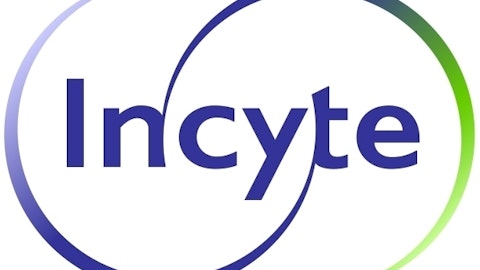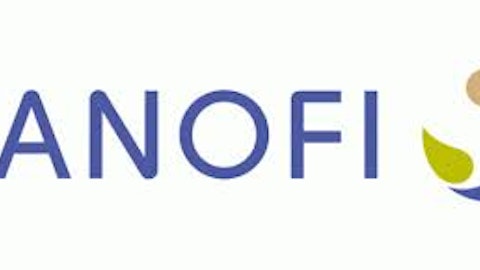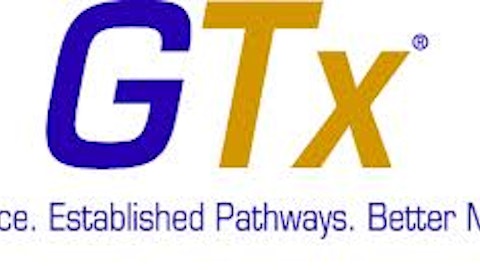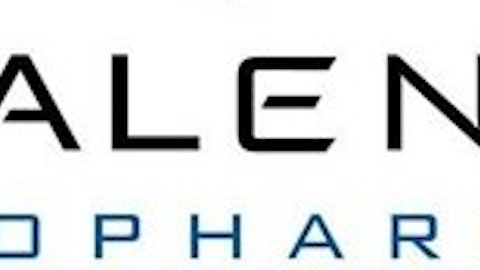Curis, Inc. (NASDAQ:CRIS) and Roche Holding Ltd. (ADR) (OTCMKTS:RHHBY) Genentech unit have stopped a hedgehog — not a spiky little beast, but a signaling pathway that could be the key in developing next-generation network-targeted cancer therapies. The hedgehog signaling pathway transmits information to embryonic cells that help them properly develop, and the proteins that move along these pathways regulate cell growth, differentiation, and survival.
However, if the pathway is improperly activated, it can cause a variety of cancers, most notably basal cell carcinoma, a common type of skin cancer. BCC is not usually fatal, but it can cause disfigurement and tissue destruction. In the United States, 30% of Caucasians are at risk of developing BCC, with 80% of cases occurring on the head and the neck.

Stopping the hedgehog generates strong sales growth
Curis, Inc. (NASDAQ:CRIS) and Roche Holding Ltd. (ADR) (OTCMKTS:RHHBY)’s hedgehog pathway inhibitor program’s greatest accomplishment, Erivedge, is an orally administered small molecule hedgehog pathway inhibitor. It attempts to interrupt the hedgehog pathway signal within the cells, disrupting the growth of advanced BCC. Erivedge was approved in January 2012, becoming the second skin cancer drug to be approved by the Food and Drug Administration following the approval of Roche Holding Ltd. (ADR) (OTCMKTS:RHHBY)’s melanoma treatment Zelboraf in August 2011. Erivedge also gained Australian approval in May and a conditional EU approval in June.
During clinical trials, Erivedge had a 43% success rate at shrinking BCC for locally advanced patients (when BCC grows deeper into the skin), and a 30% success rate at shrinking BCC for metastatic patients (when BCC spreads to other parts of the body). The treatment costs $7,500 per month for an average treatment period of 10 months.
Last quarter, higher sales of Erivedge fueled Curis, Inc. (NASDAQ:CRIS)’ 24% year-on-year increase in revenue to $5.4 million, as its adjusted EPS loss narrowed from $0.04 to $0.02 per share. Those figures exceeded the consensus estimate for revenue of $4.43 million and a loss of $0.05.
Other hedgehogs are crawling through the pipeline
Although inhibiting the hedgehog signaling pathway is a new approach to treating BCC, other competitors are already emerging. Novartis AG (ADR) (NYSE:NVS)‘s LDE-225 is the most noteworthy one, a hedgehog pathway inhibitor that is currently in clinical trials for treating BCC. It is also currently recruiting participants to test LDE-225 against Temodar for the treatment of brain cancer. LDE-225 is also undergoing preclinical studies in possibly inhibiting the growth of prostate cancer stem cells.
The wide variety of applications that LDE-225 is being tested for indicates that hedgehog pathway inhibitors could be used for an ever wide variety of purposes. Exelixis, which discovered XL139 (BMS-833923), a small molecule inhibitor of SMO (a component of the hedgehog signaling pathway), licensed the compound to Bristol Myers Squibb Co. (NYSE:BMY). Bristol Myers Squibb Co. (NYSE:BMY) is now testing XL139 in a phase 1b trial in combination with dasatinib, a tyrosine kinase inhibiting leukemia drug, for the treatment of patients with chronic myeloid leukemia.
Bristol Myers Squibb Co. (NYSE:BMY) has been followed by Pfizer, which also has an experimental hedgehog pathway inhibitor, PF-04449913, undergoing phase 1 trials for the treatment of acute myeloid leukemia. These leukemia treatments from Bristol Myers Squibb Co. (NYSE:BMY) and Pfizer could further improve the quality of life for leukemia patients. Over the past decade, leukemia patients have been helped significantly by tyrosine kinase inhibitors such as dasatinib, which have eliminated or reduced the need for traditional chemotherapy.
The Foolish bottom line
It’s clear that the approval of Erivedge has piqued other pharmaceutical companies’ interest in the hedgehog signaling pathway. New drugs from Novartis AG (ADR) (NYSE:NVS), Bristol Myers Squibb Co. (NYSE:BMY), and Pfizer might be the dawn of a new age of cancer treatments.
Although Curis, Inc. (NASDAQ:CRIS) is still unprofitable, the company is edging closer to profitability and has a robust lead product. In addition to Erivedge, Curis also has other lucrative drugs in its pipeline. One of these treatments is CUDC-247, which inhibits the IAP proteins which can help cancer cells survive. The other two treatments are CUDC-907 for myeloma and lymphoma, and Debio 0932 for advanced lung cancer.
Although Curis, Inc. (NASDAQ:CRIS) is still a tiny player in the biotech world, it has created a fascinating new treatment backed by the world’s largest oncology treatment company, Roche. That makes Curis, Inc. (NASDAQ:CRIS) and the hedgehog pathway inhibitors that it has developed a lucrative area that biotech investors should keep a close eye on.
The article Can Stopping This Hedgehog Create New Cancer Treatments? originally appeared on Fool.com and is written by Leo Sun.
Leo Sun has no position in any stocks mentioned. The Motley Fool has no position in any of the stocks mentioned.
Copyright © 1995 – 2013 The Motley Fool, LLC. All rights reserved. The Motley Fool has a disclosure policy.





